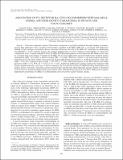Association of Fcγ receptor IIA (CD32) polymorphism with malarial anemia and high-density parasitemia in infants and young children

View/
Publication Date
2006Author
Collins Ouma, Christopher C Keller, Dorothy A Opondo, Tom Were, Richard O Otieno, Michael F Otieno, Alloys SS Orago, JOHN M ONG’ECHA, John M Vulule, Robert E Ferrell, Douglas J Perkins
Metadata
Show full item recordAbstract/
Protective immunity against Plasmodium falciparum is partially mediated through binding of malaria-specific IgG antibodies to Fcγ receptors. Polymorphic variability in Fcγ RIIa (H/R-131) is associated with differential binding of IgG subtypes and malaria disease outcomes. However, the role of Fcγ RIIa-131 variability in conditioning susceptibility to severe malarial anemia, the primary manifestation of severe malaria in holoendemic P. falciparum transmission areas, is largely undefined. Thus, Fcγ RIIa-H131R polymorphism was investigated in 493 children who came to a hospital with acute malaria. Variation in Fcγ RIIa-131 was not significantly associated with severe malarial anemia (hemoglobin [Hb] < 6.0 g/dL) or malaria anemia (Hb < 8.0 g/dL). However, relative to the heterozygous genotype, homozygotes for the R131 alleles were protected against high-density parasitemia (≥ 10,000 parasites/μL; odds ratio [OR] = 0.58, 95% confidence interval [CI] = 0.37–0.92, P = 0.02), while homozygotes for the H131 alleles were mildly protective (OR = 0.71, 95% CI = 0.45–1.13, P = 0.14). Additional multivariate analyses showed that infection with human immunodeficiency virus type 1 did not influence the associations between FcγRIIa-H131R polymorphism and malaria disease outcomes. Genotypic results presented here parallel data illustrating that parasite density is unrelated to the severity of anemia in children with acute malaria. Thus, although homozygosity for the R131 allele protects against high-density parasitemia, FcγRIIa-131 polymorphism does not protect against malaria anemia.
Collections
- Department of Zoology [161]
